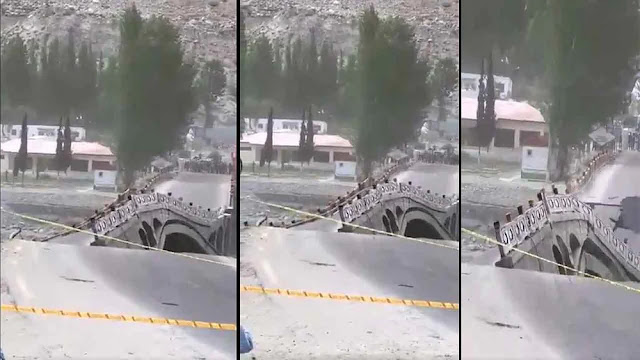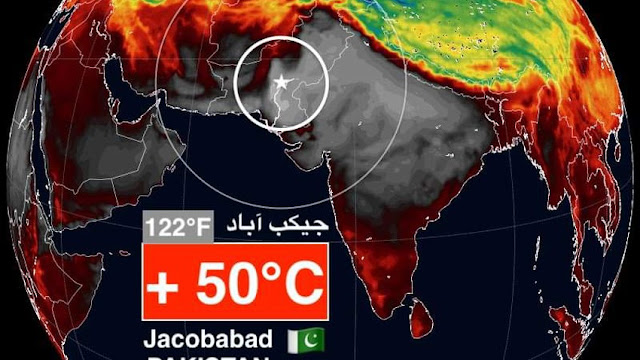
|
Hasanabad Bridge Collapse in Pakistan |
Bridge Collapse amid Heat Wave in Pakistan Raises Fears of Massive Glacier Melt Flooding
By Riaz Haq
CA
Record-high temperatures in Pakistan caused the Shisper glacier to melt rapidly, triggering the collapse of the Hassanabad Bridge along the Karakoram Highway last week. With 7,253 known glaciers, Pakistan is home to more glacial ice than any other country on earth outside the polar regions. If these glaciers start melting in increasingly severe heat waves, there could be massive flooding in the country. Pakistan is among the most vulnerable to climate change.
India and Pakistan have been hit by a severe heat wave very early this summer. Jacobabad, a city in Sindh province, hit 122ºF (50ºC) in April, one of the highest April temperatures recorded in the world. Dadu, another city in Sindh, recorded 117ºF (47ºC). "This is the first time in decades that Pakistan is experiencing what many call a 'spring-less year," Pakistan's Minister of Climate Change Sherry Rehman said in a statement. The consequences of rising temperatures in South Asia could be very severe, ranging from crop losses and food shortages to floods.

|
Record high temperature in Jacobabad, Pakistan |
Pakistan's contribution to global carbon emissions is less than 1% but it is still ranked among countries most vulnerable to climate change. The energy-hungry nation needs help to finance climate-friendly development of clean energy sources and climate-resilient infrastructure . Last year at COP26 conference in Glasgow, Pakistan provided its NDCs 2021 (national determined contribution 2021) to the United Nations. Some of Pakistan's NDC targets are voluntary while others are contingent upon the receipt of financial assistance from the rich nations most responsible for the climate crisis. Some of Pakistan's solutions are nature-based such as its Billion Tree Afforestation Project (BTAP) while others require significant increase in low-carbon energy from wind, solar, hydro, and nuclear. |
Malik Amin Aslam, former Prime Minister Imran Khan's special assistant on climate change, said in an interview with CNN that his country is seeking to change its energy mix to favor green. He said Pakistan's 60% renewable energy target would be based on solar, wind and hydro power projects, and 40% would come from hydrocarbon and nuclear which is also low-carbon. “Nuclear power has to be part of the country’s energy mix for the future as a zero energy emission source for a clean and green future,” he informed. Here are the key points Aslam made to Becky Anderson of CNN:
1. Pakistan wants to be a part of the solution even though it accounts for less than 1% of global carbon emissions. Extreme weather events are costing Pakistan significant losses of life and property.
2. Pakistan is among the countries most vulnerable to the effects of climate change.
3. Pakistan is moving towards renewable energy by converting 60% of its energy mix to renewable by 2030. Electric vehicle (EV) transition is also beginning in the country.
4. Aslam said: “We are one of the world leaders on nature-based solutions. However, the World Bank (WB) in its Report came up with really good numbers in a comparison of countries who are shifting their mainstream development towards environment-friendly policies and Pakistan came atop among them,” the SAPM explained.

|
|
Pakistan Power Generation Fuel Mix. Source - Third Pole |
Here's a video of Malik Amin Aslam's interview with CNN's Becky Anderson:
https://youtu.be/Q_s4kQXChuM
(Riaz Haq is a Silicon Valley-based Pakistani-American analyst and writer. He blogs at www.riazhaq.com )

